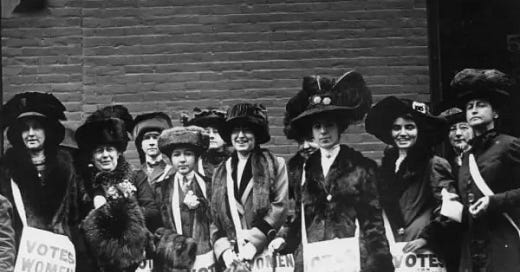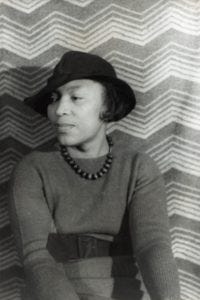Iconic Women of History Defy Our Political Categories
Fighting for the rights of women and racial minorities is not the sole purview of the progressive left
By Rachel S. Ferguson
Sometimes, I feel discriminated against, but it does not make me angry. It merely astonishes me. How can any deny themselves the pleasure of my company? It’s beyond me.
—Zora Neale Hurston, “How It Feels To Be Colored Me” In the current bizarre bundling of issues into the political “left” and “right” (whatever those terms are supposed to mean), we tend to associate the acknowledgment of minority rights and accomplishments with the progressive left. But the lives of Mary Wollstonecraft, Rose Wilder Lane and Zora Neale Hurston demonstrate that great women can’t be pigeonholed.
Most of us have probably come across the name Mary Wollstonecraft, author of the famous essay “A Vindication of the Rights of Woman” and mother of “Frankenstein” author Mary Shelley. But until I read last year’s “The Rights of Women: Reclaiming a Lost Vision” by legal scholar Erika Bachiochi, I had no idea that Wollstonecraft rooted her first-wave feminism in duties to God, family and community in ways that, today, would certainly be called conservative.
We’ve all heard of Laura Ingalls Wilder of “Little House on the Prairie” fame, but most haven’t heard of her daughter, Rose Wilder Lane. Lane became an author and outspoken journalist at the largest Black newspaper in America. Today, she is hailed as one of the three “mothers of libertarianism” by the Cato Institute, along with Ayn Rand and Isabel Paterson.
I read the gorgeous novel “Their Eyes Were Watching God” in college, but I was unaware that Zora Neale Hurston was an accomplished anthropologist as well as novelist. I was even more shocked to learn that she was shunned by other Harlem Renaissance figures because of her unapologetic individualism and her objections to communism and the New Deal. Even today, women in African American studies who want to love her don’t quite know what to do with her politics. Thanks to the excellent work of historian David Beito and political scientist Linda Royster Beito, we can glimpse into Lane’s and Hurston’s work, their philosophies and their personal journeys.
Mary Wollstonecraft
I had foolishly assumed that Wollstonecraft’s unfortunate romantic history arose from a hatred of the institution of marriage. She had two major romantic involvements, one with Gilbert Imlay, with whom she had a daughter, Fanny, and one with William Godwin, with whom she had Mary Shelley. Imlay abandoned her and she became suicidal. She did marry Godwin, but she had considered herself to be married to Imlay as well; however, she initially refrained from legal marriage because of the injustice of the institution as it existed in the late 18th century. Legally, married women had no property and no rights to their children, but because women were economically dependent on marriage, catching a husband became their primary goal.
Mary Wollstonecraft by John Opie (English, 1761-1807). Image Credit: Tate Britain/Wikimedia Commons
Wollstonecraft believed that the legal arrangement of marriage at the time trained women to be brainless flirts, followed by either surrender to helpless victimhood or power over men through manipulative control. She therefore advocated for marriage reform: “With fairer laws forming your citizens, marriage can become more sacred; your young men can choose wives from motives of affection, and your maidens can allow love to root out vanity.” In her view, marriage ought to be a kind of mutual friendship, with parenting as a primary focus of both mothers and fathers. Her desire for women’s education was geared toward not a flattening sameness with men, but intellectual excellence for women in their lives as women.
Unlike the philosophical Romanticism of her son-in-law, poet Percy Bysshe Shelley, Wollstonecraft grounded women’s rights not in a condemnation of marriage or the traditional family, but in the natural duties to one another that allow for the development and actualization of both men and women: “Let woman share the rights, and she will emulate the virtues of man; for she must grow more perfect when emancipated.” The obvious connection of healthy family life to the development of human capacity leads us to embrace a fuller and more self-controlled role for fathers and husbands, not a rejection of marriage or children for women. Furthermore, for Wollstonecraft, our moral duties are not abstract, directed at “humankind” or some such unmoored nonsense. Instead, moral duty is specifically owed to our creator, our family members and our community.
Zora Neale Hurston
As the Beitos’ article describes, Hurston grew up in Eatonville, Florida, an all-Black town and an “experiment in black self-government.” Hurston outlines in her autobiography, “Dust Tracks on a Road,” that her father was mayor and helped construct the town’s laws, so her childhood experience was one in which everyone was Black and Black people held political control. Hurston eventually received a degree in anthropology from Columbia University. As recently as 2018, Amistad (an imprint of Harper Collins) published her 1927 interviews with the last known person who could recall life in Africa and the travails of the Middle Passage under the title “Barracoon.”
Hurston condemned race prejudice, but she did so from an individualist perspective. She objected not only to white racism, but also to race consciousness in general. She argued in 1942 that the human race was on the verge of blotting itself out because of race consciousness, so she resisted it in the form of both race prejudice and race pride. She condemned the latter because of its tendency to dwell on grievances over past wrongs—a tendency that is susceptible to manipulation. Both Hurston’s anthropological work and her novels focus on the real, gritty and unique realities of Black lives and, later in life, of white lives, too. She condemned both the conservative and liberal depictions of Black people as either happy and unbothered or “low, miserable, and crying,” respectively. Like all people, Black people’s experiences are not a monolith, but all people have their own mixture of happiness and misery and their own unrepeatable set of experiences.
Zora Neale Hurston by Carl Van Vechten (American, 1880-1964). Image Credit: U.S. Library of Congress/Wikimedia Commons
Unlike her sometime friend Langston Hughes, Hurston was severely anti-communist. She hated communism’s collectivism and its rejection of free enterprise and “free vertical movement” through entrepreneurship. She called communism “a rotting fog hovering over the land.” She also opposed the New Deal, which she saw as a powerful political weapon wielded to make people dependent and obedient. Part of her objection to communist propaganda was its tendency to paint Black Americans as hopelessly downtrodden. In contrast, Hurston argued that Black Americans are much like all Americans—they dream of climbing up the ladder of economic flourishing and don’t appreciate bring cast by the communists as a “low, degraded mass.” Hurston argued that the communists made little headway in Black America because they embraced the very stereotypes of Black people from which they claimed to defend them. Even worse for her writing career, Hurston condemned the effects of communist thought on some Black literary figures. She criticized Richard Wright, for instance, for creating brutish caricatures of Black people to serve “social document fiction” instead of real, honest art.
In Hurston’s last piece of writing to get much public attention, she expressed doubt that Brown v. Board of Education, the 1954 Supreme Court decision that held that racially segregated public schools (under a doctrine known as “separate but equal”) were unconstitutional, would accomplish all that pro-integration Americans hoped. While Hurston supported integration, she was concerned about tyrannical government and the undermining of Black schools. It’s interesting to consider how Hurston’s concerns about Black schools echo criticisms today that Brown resulted in the loss of tens of thousands of Black teachers and subjected Black children to hostile learning environments that soured some of them on school. Hurston was nothing if not incendiary in her time, but economic and sociological research seems to be coming around to her unusual insights after all.
Rose Wilder Lane
Readers who grew up watching the television adaptation of “Little House on the Prairie” or reading the series of books will be familiar with the kind of pioneer life in which Rose Wilder Lane grew up. Knowing this background, I was surprised to find that Lane seriously considered communism as a young woman and even planned to join the party. Her travels to the USSR, however, disabused her of the notion that a centrally planned economy could be either practical or just. Lane wrote two books dealing with her political philosophy: “Give Me Liberty” and “The Discovery of Freedom.” In the latter, Lane tells the story of three societies: ancient Israel, the Saracen empire of Islam and early America. She argues that these three societies experienced genuine freedom and economic flourishing because a belief in one father God gave rise to a notion of individual dignity that pushed back against authoritarian government.
Rose Wilder Lane, 1921. Image Credit: Wikimedia Commons
Lane wrote extensively against Franklin Roosevelt and his New Deal, calling it a centralized state and arguing that it appeals to “a ‘pagan’ theory that outside authority controls, or should control, individuals.” Like Hurston, Lane was deeply suspicious of Roosevelt’s foreign policy before World War II, even campaigning for a constitutional amendment that would add a referendum to the requirements for a congressional declaration of war. While Lane, like Hurston, supported the war after Pearl Harbor, she kept a watchful eye on the president and his “New Deal bungling and bureaucratic hubris.”
Lane’s time with the Pittsburgh Courier (1942-1945) lined up with the editorial career of George Schuyler, better known as “the Black H.L. Mencken.” The newspaper’s founder, Robert L. Vann, and Schuyler were both intense anti-communists, and Schuyler became increasingly frustrated with Roosevelt’s abysmal performance on issues of racial justice. Schuyler was philosophically consistent, too, arguing against Japanese internment and the dropping of the atomic bomb.
Lane was impressed with the paper and came on board to advocate for her unique brand of laissez-faire anti-racism. She took every opportunity to praise Black business success and associated the fight against Jim Crow with America’s tradition of liberty. She saw the obsessions with race and class as a kind of new paganism, in which we worship the gods of “Economic determinism or Society or Government.” Lane felt that the reporting of the Pittsburgh Courier had awakened her to her own racism, in which crimes like lynching seemed like merely isolated incidents. She vowed to awaken other ignorant whites to Black realities and to fight for her “country’s cause, the cause of human rights.”
Fighting Parochialism
One way to rebel against the parochialism of the moment is to learn about historical figures without trying to make them align with our own political categories. The grounding of Mary Wollstonecraft’s concerns about women’s rights in “conservative” insights about God, family and civil society demonstrates that ideological alignments were not always—and don’t have to be—what they are right now. The way that Zora Neale Hurston loved to study and impart the unique, multivalent experiences of Black Americans shows that we, too, can love and appreciate traditions and subcultures without embracing identity politics. And Rose Wilder Lane’s mash-up of libertarian philosophy and anti-racism highlights how silly it is to think that we help marginalized groups only by condemning the American project or the hope for these groups’ economic flourishing in a market system. Instead, as we conclude Women’s History Month, let’s follow the lead of these remarkable women by unbundling individual political and cultural issues from the labels of “left” and “right” and realigning them based on well-reasoned principles.







